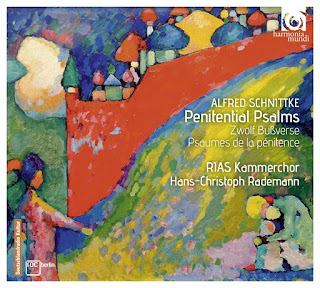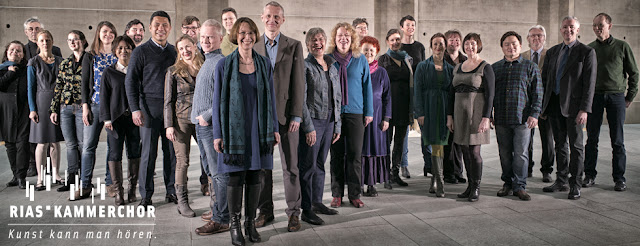Alfred Schnittke Penitential Psalms; RIAS Kammerchor, Hans-Christoph Rademann; Harmonia Mundi
Reviewed by Robert Hugill on Apr 22 2016
Star rating:
Passionate intensity and technical prowess in these dark psalms.
This new disc from the RIAS Kammerchor and conductor Hans-Christoph Rademann on Harmonia Mundi showcases Alfred Schnittke's sacred music. They perform Schnittke's Penitential Psalms and Three Sacred Hymns, two works which sit either side of Schnittke's great Choir Concerto and with it make a significant contribution to 20th century unaccompanied choral repertoire. Though when he came to write the works, Schnittke had become a Catholic, they retain a strong engagement with the Russian Orthodox Faith and Schnittke weaves Russian chant into his distinctively intense and knotted harmonies
Reviewed by Robert Hugill on Apr 22 2016
Star rating:
Passionate intensity and technical prowess in these dark psalms.
This new disc from the RIAS Kammerchor and conductor Hans-Christoph Rademann on Harmonia Mundi showcases Alfred Schnittke's sacred music. They perform Schnittke's Penitential Psalms and Three Sacred Hymns, two works which sit either side of Schnittke's great Choir Concerto and with it make a significant contribution to 20th century unaccompanied choral repertoire. Though when he came to write the works, Schnittke had become a Catholic, they retain a strong engagement with the Russian Orthodox Faith and Schnittke weaves Russian chant into his distinctively intense and knotted harmonies
Schnittke wrote his Choir Concerto in 1985 setting texts from the Book of Lamentations by the Armenian mystic, Gregory of Narek. Written three years later for the commemoration of the Christianisation of Russia (which started with the baptism of grand Prince Vladimir in Kievan Rus), the Penitential Psalms set anonymous Lenten poems from an anthology of 16th century Old Russian texts. The twelve psalms live in the same sound-world as the Choir Concerto, and the texts' obsessions with original sin, full of sorrow, and lamentation, calls for music of great austerity yet great intensity from Schnittke.
The vocal writing is often syllabic, highlighting the text, and Russian chant imbues the outlines of the melodies, but this is allied to a closely-knotted sense of harmony which, rather then giving a feeling of richness, creates a sort of dark austerity despite the clusters of notes. Schnittke's structures make great use of devices like canons, parallel movement of voices, and drones. Overall the psalms are darker, more austere and more hard edged than the Choir Concerto, but Schnittke also introduces moments of great radiance, as briefly he allows the clouds to lift.
The work opens with just lower voices, dark and intense with the angularity of the harmonies creating a feeling of austerity. The second psalm uses a tenor solo over choral drones to express music of great anxiety and anguish. These themes continue throughout the work. Though there are the moments of radiance when we hear the harmonised chant in all its glory, and movements like the eighth psalm which are gentle expressive, the overall tone of the work is one of sustained intensity and suffering.
It is a remarkable sequence, and Rademann and his choir give us a superbly sustained sequence of music as one psalm flows into another with great naturalness and a sense of inevitability of structure. It is also remarkable technical feat, this is not easy music yet the RIAS Kammerchor give a superbly confident and expressive performance. I have sung Schnittke's Choir Concerto twice and can testify to the amount of energy and commitment that this type of music needs. Perhaps the greatest compliment to the choir is that they take us on a journey and we forget the sheer complexity of the music. For some of the later psalms, Schnittke strips the texture back so that we have a solo voice against wordless chorus until final no words are possible and the last, eerie, psalm is marked 'mit geschlossenem Mund' (with closed mouth)
In his note in the programme book, conductor Hans-Christoph Rademann explains that in preparing the performance they were able to go back to Schnittke's original autograph and so remove many of the later accretions added by editors, as well as doing some basic corrections of notes.
They accompany this major work with something a little smaller but no less impressive. The Penitential Psalms were premiered by the conductor Valery Polyansky and the USSR State Chamber Choir in 1988. Polyansky had already premiered Schnittke's Choir Concerto, but earlier than this in 1983 Polyansky had asked Schnittke for an unaccompanied work for choir and after first being denied, was presented with Three Sacred Hymns, (Hail, Mary, Lord Jesus Christ, Son of God and Our Father). The three are more lyrical than the penitential psalms, but still richly textured with some positively luscious harmonies and the second prayer is wonderfully radiant.
This is a major recording of some of the 20th century's most significant unaccompanied sacred music in performances which demand to be listened to.
Alfred Schnittke (1934-1998) - Twelve Penitential Psalms
Alfred Schnittke - Three Sacred Hymns
RIAS Kammerchor
Hans-Christoph Rademann
Recorded February 2015, Jesus-Christus Kirche, Berlin-Dahlem
HARMONIA MUNDI HMC902225 1CD [54.49]
Available from Amazon.co.uk
Elsewhere on this blog:
- Sheer brilliance: Charles Owen & Katya Apkeisheva in Stravinsky's Rite of Spring at Rhinegold Live - concert review
- Magical moments: On Eagles Wings, Alexander L'Estrange sung by Tenebrae - CD review
- Show, don't tell: Clocks 1888: The Greener - Opera review
- Tactile, mystical, sensuality: Orchestral music by Julian Anderson - CD review
- An appealing & definite voice: Clarinet music by Carl Vollrath - CD review
- Rather surprising: Bruckner Orchestra Linz in Beethoven and Philip Glass - concert review
- Bringing vibrant Americas to rush-hour Waterloo: Southbank Sinfonia - concert review
- My favourites too: Viri Galilaei, favourite anthems from Merton College Choir - CD review
- Eclectic mix, magic moments: Tallis Scholars in Nico Muhly, Matthew Martin, William Cornysh, Thomas Tallis, Arvo Pärt - concert review
- Stunning simplicity: Donizetti's Roberto Devereux, Met Live in HD - opera review
- The Dream Stream: Estonian Philharmonic Chamber Choir - concert review
- Home




%20in%20The%20Merry%20Widow.%20Credit%20Mihaela%20Bodlovic.%20(2).jpg)

%20in%20Trial%20by%20Jury.%20Credit%20Mihaela%20Bodlovic..jpg)

%20Britten%20Pears%20Arts%20(1).jpg)




No comments:
Post a Comment